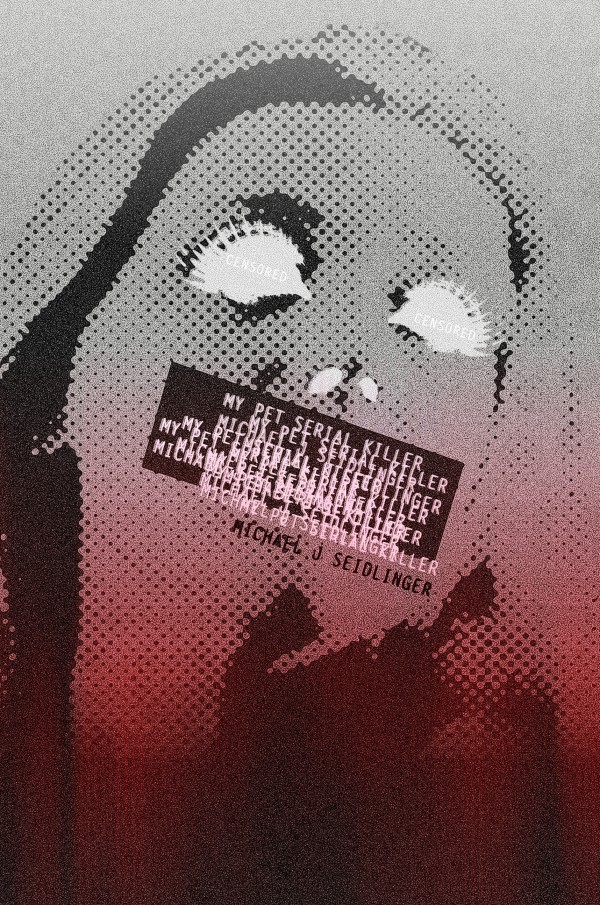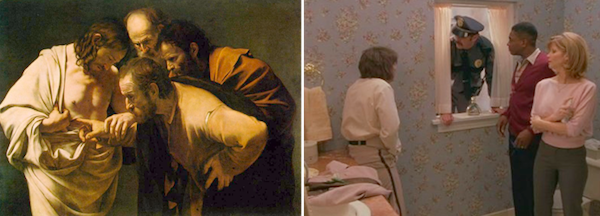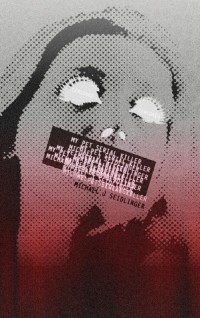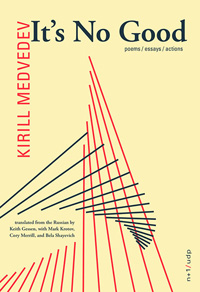No Matter of Insistence
 Left Having
Left Having
by Jesse Seldess
Kenning Editions, 2011
112 pages / $14.95 Buy from Kenning Editions or SPD Books
Jesse Seldess’s work asks for time. It doesn’t demand time, it just gently requests it. A space to sit with it, a time to read it aloud, to perform it yourself in your own voice and body.
In his two books—Who Opens and Left Having (both from Kenning Editions)—Seldess writes short echoing, transmogrifying lines, separated often by large spaces on the page. The poetry is formed out of these minimal bits and their steady repetition: lines that subtly alter as they repeat in various forms over the course of the pages.
If I let the ending continue
If I left impending continue
If I left the end to you
We can meet in this place
Previous to seeing his books, I’d heard Seldess reading his poetry in a recording on Pennsound. I was blown away by the slowness, the paused rhythm, the continual stops. It felt daring to stand up and read in this glacial way, and yet his voice was so unassuming about his slowness. At the end of one reading, he says, “Thanks for your patience.” It’s an endearing experimentalism, an quietly apologetic foray into a different kind of poem. I like the playful timidity of his work, his awareness of the space it takes up in the world. An antithesis of (and antidote to) avant-garde bravado.
In all of Seldess’s work is an attention to the spaces between: “Incompletely binding // Little things / With.” This hanging preposition signals the silence that often serves as a super-structure for his work. In his readings, Seldess carefully matches the length of his silences to the size of the spaces between lines and stanzas on the page.
This very concrete relationship between page and performance appears to be one of Seldess’s central concerns: from 2000 until 2012, Seldess published antennae, a journal of experimental writing and language-based music and performance scores. (Issues 1-7 are available as free pdf downloads. Issues 9-12 are available for purchase. Issue 8 seems to be in limbo.) When work is so intensely aural, the page begins to function as a score for performance.
In one of his readings on Pennsound, Seldess says of his first book, Who Opens: “all the pieces in the mansucript in some way are concerned with the issues and dynamics of formation, sort of an awe, wonder, and appreciation of it, and at the same time a fear and skepticism of it, ranging through that spectrum.” I felt this powerfully in both of the books: an attention to how words build or fail to build, to how the mind is able or unable to form something out of words.
Some of the poems in Seldess’s first book emerged out of his work in social services with the elderly, specifically with those affected by dementia and Alzheimers. This awareness of the mind and its failures is powerfully present: all the time thinking about contact: “To be close // Near that mouth / From here instance.”
January 21st, 2013 / 12:00 pm
Giveaway: MY PET SERIAL KILLER

Michael Seidlinger is giving away 5 copies of MY PET SERIAL KILLER, which is out today. Comment to enter, check back in a week to see if you won, you know the drill:
If any serial killer could “be yours”, who would it be?
The 240 Best Movies of 2012
Last year I wrote a post, “The 248 Best Movies of 2011,” where I tallied all the film data reported at the site Year-End Lists, which reports critics’ year-end lists for movies, music, and books. Film critics surveyed include Andrew O’Hehir, A.O. Scott, Dennis Cooper, J. Hoberman, John Waters, Kenneth Turan, Manohla Dargis, and Roger Ebert, as well as journals like the A.V. Club, Cahiers du Cinéma, Film Comment, and Sight & Sound. The site also reports on the accolades dished out by various organizations and critics circles.
Since 2012 is now mostly a matter of record, I once again tallied things up, in order to see how critics have already begun to regard the past year. But before we dive into the data, a few caveats:
- The value of the numbers below is primarily relative, not absolute. Some critics were sampled more than once, since they not only make their own lists, but also contribute to larger lists (such as the Sight & Sound poll, or the New York Film Critics Circle Awards).
- Every time a film was mentioned, I gave it a single point. In other words, I didn’t weight films, even if a given critic’s year-end list was ranked. (I just don’t have the time to do that.) Honorable mentions and near-misses also counted for a point; that’s just the way it goes. But I think this is OK: my primary intention is to see which films are being thrown about in regards to “the best films of the year,” and I think an honorable mention does just as well as the #1 spot. We’ll let the frequency of mentions do the weighting for us.
- I also counted each award received as a single point. Thus, the New York Film Critics Circle awarded Zero Dark Thirty three prizes: Best Picture, Best Director, and Best Cinematographer—and that counts as three points for our purposes. I think this is fair because, in addition to seeing which films are being singled out, we’re trying to gauge how much they’ve been praised relative to one another. Counting awards like this will pull the most honored films toward the top.
Again, keep in mind that this is all pretty relative. I also won’t claim that we’re sampling all the data we should be sampling; I just went with what’s at the Year-End Lists site. Also, note that a strong bias was given to English-language critics, especially US-based ones—but that, my friends, is the data to which I have the readiest access.
Caveats aside, however, the results strike me as representative of the cinematic zeitgeist c. January 2013. Because without doubt, the two films from 2012 that I’ve seen critics talking the most about have definitely been—
Kim Kardashian on Writing
“I think my sense of style is evolving.”
“I don’t really have goals as far as, I want to be on a cover or something like that.”
“I play into the perception of me, but it’s not really me.”
“I am hands-on in any project that I am associated with. I just don’t want to put my face or name and lend it to a product that I’m not behind a hundred percent.”
“I always say you shouldn’t weigh yourself. I don’t even have a set of scales in my house.”
“I am fascinated by crime scene investigating. I swear, I wish I was a crime scene investigator sometimes!”
“Botox to me is not surgery.”
“I am really cautious about what I say and do.”
“I want to be a vampire. I kind of want to be evil.” READ MORE >
Some things about Mary

Caravaggio’s The Incredulity of Saint Thomas (c. 1602), known colloquially as “Doubting Thomas,” shows the titular Apostle incredulously putting said incredulity to rest upon sticking his finger inside Jesus’ wound after his resurrection (whose phonetic ties to “erection” may be our first mouthful of phallicy). Jesus says, “Blessed are those who have not yet seen and yet have believed,” a somewhat snarky comment directed at the proof contingency of Thomas. God, a prick in my book, denies the Virgin Mary any clitoral or vaginal stimulation, deferring to the “divine agency” of his bodiless baby batter. Anal seemed out of the question as well. Their son Jesus is likewise denied carnal knowledge with his own Mary (Magdelene), our codependent threesome the world’s first dysfunctional family. I’ve always found Jesus’ loin cloth a sunken concavity, almost tucked-in in trying perhaps to be a daughter. Emasculate comes from the latin emasculare, meaning castrate, fortunately used in a figurative sense. Ben Stiller’s comedic and dramatic qualms in Meet the Parents, Reality Bites, Greenberg, and There’s Something About Mary all tell the story of a dude’s trouble either getting or holding on to the girl. It’s bro humor, but not of sexual entitlement, rather, feminine-like worry and desire for love. Zoolander may even have a touch of peer misandry, and I find Stiller’s work “cutting edge” when it comes to chronic castration anxiety. Back in Rhode Island, in which most Farrelly brothers films are set, Mary’s mother and step-father, along with a doubting cop, cannot believe what Ted Stroehmann did to his “frank” and “beans” until they see it. Here the Farrelly brothers cut to the proof, in the unedited version at least.
MANIFESTO FOR 2013
Pyramids. The only desirable tombs. Monoliths, obelisks, this ancient geometry of form. The way energy floats, fuck the new age bullshit sometimes you cannot deny that this is reality. The scent of immortality. Endless lust buried in this cold earth. Aesthetics as holy gods. No competition, only artifice. Beautiful, beautiful artifice. Something to look forward to. Something accountable. My own private structural system. Cold night howls. The expulsive glossolalia’d voice; I AM GOD.1
It’s time we cut out the bullshit. It’s time we start making something that either lifts us into the air. Accelerate through fiction and into a new reality. Nothing is perfect but it can always be new.
1#45, excerpted from Errors; or Dreams I’ve Never Had
The Chick Flix Series #FridayReads

Jennifer L. Knox is currently curating a super fucking spectacular series of essays on women in cinema over at the consistently awesome Delirious Hem.
Here is a list of the writers and films, which includes Laura Carter on Desperately Seeking Susan, Carrie Lorig on Divine Horsemen, Gina Abelkop on Meek’s Cutoff, Danielle Pafunda on Jennifer’s Body, and many, many more.
Here is an explanation of its inception.
Here is Becca Klaver’s “Teaser Guide” to the series.
And here are the contributions thus far.
It’s No Good
Kirill Medvedev was born in Moscow in 1975. In addition to writing, he has translated, written critical essays on contemporary Russian literature and politics and their “bloody crossroads”, run his own bare bone publishing house, and organized opposition against Putin.
His first book of poems, Vse Plokho (Everything’s Bad or It’s No Good) appeared in 2000; his second book Vtorzhenie (Incursion) combined poetry and essays on subjects ranging from 9/11 to the vocabulary of pornography. Soon, thereafter, fed up with Moscow’s intellectuals acquiescence with Putin’s stabilization (or, as he might say, pacification), he went into “internal exile”—renouncing all contacts with literary life, whether publishing, readings, or roundtables or even claiming copyright for his writings. While continuing to post his poems and essays on his website and Facebook page, he has channeled his considerable energy into publishing (mainly canonical leftist criticisms of capitalism, well known in the West but not in Russia), political activity as part of the small socialist movement Forwards (Vpered) and taking to the streets to challenge Putin’s regime together with a few supporters holding handmade signs.
In It’s No Good, Keith Gessen brings together a representative sample of Medvedev’s diverse ouvre. Selections of poems from his two collections and later works as well as of his essays are preceded by Gessen’s extensive introduction to Medvedev, the poet and, equally importantly, Medvedev the critic of literature, the literary establishment, and Russia’s stunted politics. We learn how Gessen discovered Medvedev’s poetry and political writing and how it downed on him that Medvedev had very important things to say to him and to his New York friends who were trying to confront the inequities of capitalism in their own backyard. The collection, an obvious labor of love, works effectively at many levels and will surely widen the circle of Medvedev’s admirers in this country. Would it be wishful thinking that it will also, as if by ricochet, do it for Medvedev in Russia?
January 18th, 2013 / 12:00 pm
Telegrams of the Soul
When someone says, “Flash fiction is popular because of the internet, kid’s attention span these days…” why don’t you kick them right in the balls? Why don’t you sweep the leg for me?
Peter Altenberg lived from 1859-1919. Adolf Loos, the famed modernist architect, made the cross for his grave.
You like blurbs? Check these fucking blurbs. You wish. This isn’t your mom’s pal or former teacher or little Internet buddy in an indie/alt scene circle-jerk let’s get drunk at AWP and wear skinny, colored eyeglasses type of blurb, you fuckers. This is Kafka going, “In his small stories his whole life is confirmed” and oh, Thomas Mann going, “If it be permitted to speak of ‘love at first sound,’ then that’s what I experienced in my first encounter with this poet of prose.”
Kafka just blurbed your ass. Get it?
Altenberg quit everything. Law school, medical school, book-selling. His own name. He got a doctor’s note, he did, a doctor’s note excusing him from life. A golden ticket. He spent the rest of his days in bars, coffee bars and good old regular bars. He liked drinking and whores, just like anyone with time on their hands.
He wrote about it, this life, in fits of brevity.
You should probably start here and then just learn to read German afterwards.
My Pet Serial Killer
 My Pet Serial Killer
My Pet Serial Killer
by Michael Seidlinger
Enigmatic Ink, 2013
316 pages / $13.99 buy from Amazon
Rating: 8.8
My Pet Serial Killer is an honest look at relationships. Yes it may be surprising that it took a main character that disembowels unsuspecting women to explore the power dynamic that exists between any two people in a relationship. That’s just how Seidlinger operates. Seidlinger is the sickest of the fucks. Few can compare. What’s doubly refreshing, though, is exactly what is left in and out of the book. Occasional gory details make their way through the passages (how a person tastes like cinnamon, etc.) but the main focus is the relationship between the killer (Victor) and the observer (Claire). READ MORE >
January 17th, 2013 / 1:00 pm





